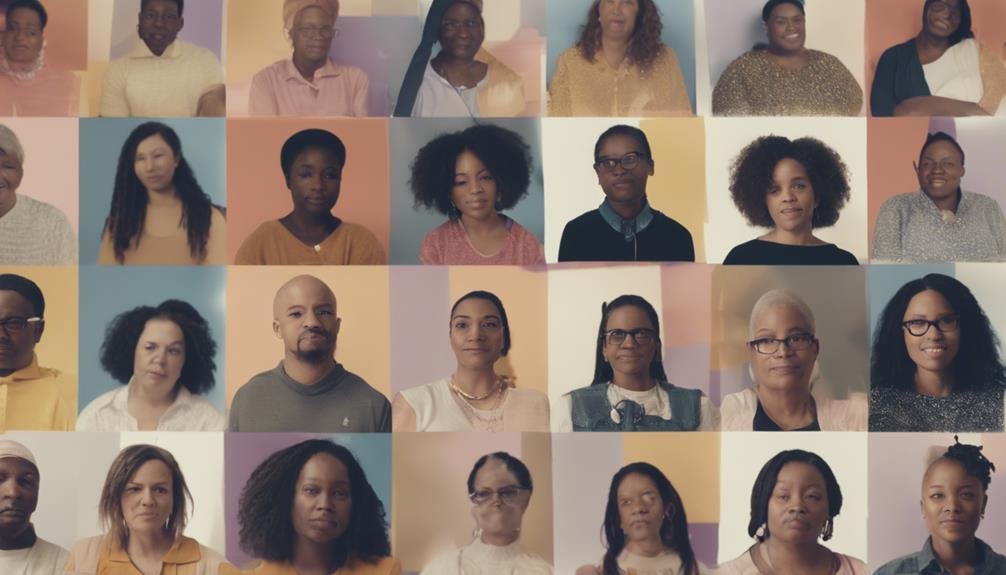Certain strategies curb domestic violence by targeting root causes, empowering individuals, and reshaping societal norms. Early childhood interventions shape healthy relationship views and reduce aggressive behavior. Recognizing abuse education equips communities to identify warning signs and take action. Gender equality measures combat power imbalances, promoting empowerment and challenging harmful norms. Media campaigns spread awareness and shift attitudes, fostering zero tolerance. Structural policies like legal reforms and economic support hold perpetrators accountable and empower survivors. Societal shifts focusing on respect, empathy, and effective communication create a culture less tolerant of abuse. Elaborating on these strategies reveals a holistic approach to combating domestic violence.
Key Takeaways
- Early interventions shape healthy relationships.
- Recognizing abuse educates communities to spot warning signs.
- Gender equality measures combat power imbalances.
- Media campaigns raise awareness and offer support.
- Structural policies hold perpetrators accountable and empower survivors.
Early Childhood Interventions
Early childhood interventions play a crucial role in shaping children’s understanding of healthy relationships and social interactions. These programs are designed to instill values of respect, empathy, and positive behaviors in young individuals, laying the groundwork for healthy relationship behaviors later in life.
By teaching children about different types of touch and how to recognize and report abuse, early interventions empower children to protect themselves and others from harm. Additionally, positive skills programs implemented in early childhood settings have been shown to reduce aggressive behavior and promote non-violent conflict resolution methods.
Through these interventions, children learn the importance of empathy, communication, and cooperation, which are essential components of building and maintaining healthy relationships. By addressing root causes of violence early on and promoting positive behaviors, early childhood interventions aim to break the cycle of violence and create a safer, more respectful society for all.
Recognizing Abuse Education
Recognizing abuse education plays a pivotal role in educating communities about the dynamics of abuse, enabling them to protect themselves and support others in harmful situations. By understanding controlling behaviors and intimidation tactics, individuals can recognize warning signs early on and intervene to prevent escalation.
This education empowers both victims and bystanders to take action, seek help, and break the cycle of violence. Training programs play an essential role in equipping individuals with the knowledge and skills to identify and address signs of domestic violence effectively.
Early intervention is key in mitigating the impact of domestic violence, and recognizing abuse education is a fundamental step in creating a supportive environment that can effectively address such issues. By promoting awareness and providing tools for intervention, recognizing abuse education serves as an important strategy in curbing domestic violence and fostering a safer society for all.
Gender Equality Measures
Understanding the importance of gender equality measures is essential in addressing the root causes of domestic violence and promoting a safer society for all individuals. Gender equality initiatives play a vital role in combating domestic violence by tackling power imbalances that often underlie abusive behaviors in intimate relationships. By promoting women’s empowerment and ensuring equal rights for all genders, these measures work towards creating healthier, more respectful relationship dynamics.
Gender equality policies are specifically designed to challenge traditional norms that can perpetuate domestic violence. These policies aim to dismantle societal structures that condone or enable abusive behaviors, fostering environments where violence is less likely to occur.
Investing in gender equality initiatives has been shown to correlate with lower rates of domestic violence, highlighting the effectiveness of these strategies in creating safer communities.
Media Campaigns and Awareness
Media campaigns and awareness initiatives play an essential role in educating the public about recognizing and addressing domestic violence. Through various channels like television, radio, social media, and print, these initiatives aim to spread messages concerning healthy relationships, warning signs of abuse, and avenues for seeking help.
The National Domestic Violence Hotline’s campaigns have been particularly successful in offering crucial support, crisis intervention, and education to individuals experiencing abusive situations. By increasing Domestic Violence Awareness, these efforts not only empower victims to seek assistance but also encourage perpetrators to break the cycle of violence and access life-saving services.
Moreover, public awareness campaigns contribute significantly to shifting societal attitudes towards domestic violence, fostering a culture of zero tolerance for abuse. By engaging the public through these media campaigns and public service announcements, a broader segment of society can be reached, creating a more informed and supportive environment for those affected by domestic violence.
Structural Policy Interventions

Structural policy interventions, such as legal reforms impact, economic empowerment programs, and housing assistance initiatives, play a vital role in addressing domestic violence.
These strategies aim to create a legal framework that holds perpetrators accountable, empower survivors economically, and provide safe housing options for those fleeing abusive situations.
Legal Reforms Impact
Legal reforms have demonstrated significant impact in mitigating domestic violence through their structural policy interventions. By criminalizing domestic violence and enhancing penalties, legal measures create a deterrent effect, leading to a decrease in abuse incidents. Strengthening protective orders and enforcing consequences for offenders are essential steps in curbing domestic violence and ensuring victim safety. These structural policy interventions not only hold perpetrators accountable but also contribute to changing societal norms surrounding domestic violence.
Policies that prioritize victim safety, support services, and legal recourse play an important role in creating a hostile environment for perpetrators. Improved access to legal support and advocacy services further protects victims and prevents further violence. Legal reforms emphasizing accountability, deterrence, and swift responses to domestic violence cases are crucial in reducing instances of abuse and fostering a safer community.
Enforcing consequences for offenders through legal means is a critical strategy in addressing domestic violence effectively.
Economic Empowerment Programs
Economic empowerment programs play a pivotal role in reducing domestic violence by addressing financial dependence and increasing victims’ financial independence. These programs offer essential resources such as job training, financial literacy, and access to employment opportunities, which help diminish economic strain and power imbalances within relationships.
By fostering economic stability and self-sufficiency, victims are better equipped to extricate themselves from abusive situations and establish independence. As structural policy interventions, economic empowerment programs target the underlying economic factors contributing to domestic violence, aiming to break the cycle of abuse.
Research indicates that these programs have a positive impact on reducing instances of domestic violence and empowering survivors to reconstruct their lives. Through a combination of practical skills, education, and employment support, economic empowerment programs serve as critical tools in not only preventing but also mitigating the effects of domestic violence by enhancing financial autonomy and diminishing vulnerabilities stemming from financial dependence.
Housing Assistance Initiatives
Implementing housing assistance initiatives is essential in providing stable housing options for domestic violence survivors, thereby reducing the risk of further violence. These programs offer financial support for rent, security deposits, and utilities, ensuring survivors can secure safe housing away from their abusers.
By providing stable housing, survivors are less dependent on their abusers, empowering them to break free from abusive situations. Access to safe and affordable housing plays a pivotal role in preventing domestic violence and fostering long-term safety for women experiencing abuse.
Housing assistance initiatives contribute greatly to the overall well-being and independence of survivors, allowing them to rebuild their lives free from violence. These programs are instrumental in breaking the cycle of abuse and promoting the recovery and empowerment of domestic violence survivors.
Societal Shift Towards Respect
You can foster respectful behavior norms by promoting empathy, effective communication, and conflict resolution skills.
Empowerment through education plays an essential role in challenging harmful gender stereotypes and promoting equality within relationships.
Respectful Behavior Norms
A societal shift towards respect is vital for promoting healthy relationships and reducing instances of domestic violence. Establishing respectful behavior norms within a society creates a culture of mutual understanding, empathy, and respect. When respect is emphasized in relationships, it fosters effective communication and conflict resolution skills, which are essential in preventing and addressing instances of domestic violence.
Respectful behavior norms also challenge traditional gender roles and power dynamics that can contribute to violence within relationships. By encouraging respect as a core value, individuals are more likely to recognize and address abusive behaviors, leading to healthier and more equal relationships.
This shift towards mutual respect not only reduces the prevalence of domestic violence but also creates a more inclusive and supportive environment for all individuals.
Empowerment Through Education
How does education play a pivotal role in empowering individuals to foster a societal shift towards respect and reduce instances of domestic violence?
Education serves as a powerful tool in empowering individuals to recognize unhealthy behaviors and promote respect in relationships. By teaching about healthy boundaries and communication skills, education equips individuals with the knowledge to navigate relationships in a respectful manner, thereby reducing the likelihood of domestic violence occurrences.
Additionally, cultivating a culture of respect and equality through education helps shift societal norms towards healthier relationship dynamics. When individuals are made aware of their rights and available resources, they’re empowered to seek help and break the cycle of abuse.
Education on consent and gender equality is essential in preventing domestic violence and fostering environments where respect and healthy relationships flourish. By emphasizing empowerment through education, society can make significant strides in curbing domestic violence and promoting a culture of respect.
Frequently Asked Questions
What Are Some Strategies for Reducing Violence?
To reduce violence, community involvement, education, mental health support, prevention programs, workshops, counseling services, law enforcement training, victim advocacy, housing resources, and social services partnerships are essential. Collaborative efforts empower individuals and create safer environments.
Why Is Domestic Violence Prevention Important?
Domestic violence prevention is essential for community well-being. Through community engagement, education, and early intervention, individuals receive support, resources, and empowerment. By promoting awareness and providing assistance, we can curb violence and protect mental health.
Why Is It Important to Reduce Violence?
Reducing violence is essential for community well-being. Empower victims through education, mental health support, and early intervention. Implement legal consequences, cultural awareness, economic empowerment, and support networks. Engage in proactive strategies to create safer, healthier environments.
What Could the Justice System Do More Effectively to Reduce Domestic Violence?
To reduce domestic violence effectively, law enforcement must prioritize victim support, community involvement, and education programs. By enhancing offender rehabilitation, enforcing legal consequences, challenging cultural norms, and optimizing resource allocation, the justice system can foster safer environments.
Conclusion
By implementing a combination of early childhood interventions, recognizing abuse education, gender equality measures, media campaigns, and structural policy interventions, society can effectively curb domestic violence.
These strategies have been shown to address root causes, change societal attitudes, and provide support to victims.
As the data suggests, a multi-faceted approach is the most effective way to combat this pervasive issue and create a more respectful and safe environment for all individuals.




![How to Heal From Emotional Abuse in Relationships: Therapist Approved Strategies [2022]](https://heatherwilliamsempowers.com/wp-content/uploads/2024/06/healing_from_emotional_abuse-768x439.jpg)


